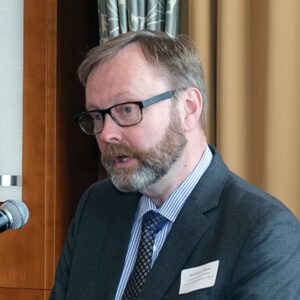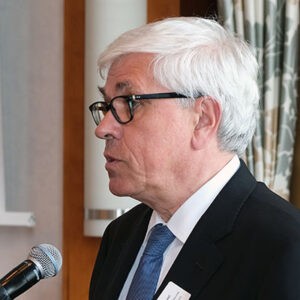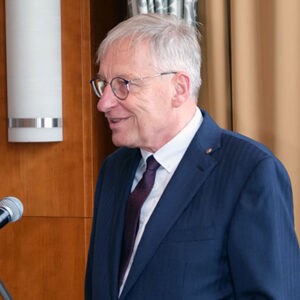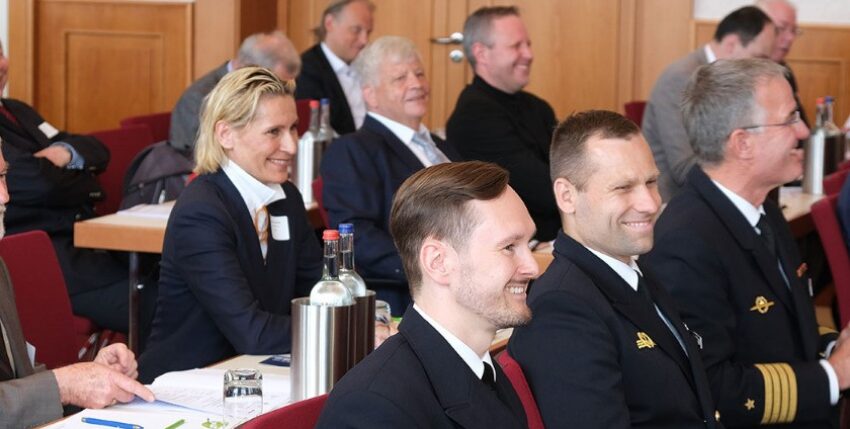8th Maritime Colloquium of the German Maritime Institute in Wilhelmshaven
When the President of the German Maritime Institute (DMI), Rear Admiral (ret.) Karsten Schneider concluded the DMI's 8th Maritime Colloquium with these words, it was possible to look back on a series of challenging presentations and panels. On 24 May 2022, maritime security experts gathered at the Atlantic Hotel Wilhelmshaven for the Topic: "The German Navy facing new tasks - new challenges - new capabilities?" arrived.
The organiser was supported by the German Navy's Operational Flotilla 2, the griephan information service, the German Naval Association, the German Armed Forces Association and the German Atlantic Society. It was the first face-to-face event since the outbreak of the pandemic and the first event following the DMI's move to its new office in Wilhelmshaven. The hall was fully booked and high-ranking representatives from business, politics and science had registered. DMI President Schneider opened the event and explained the choice of topics - the focus on the "Indo-Pacific" had been expanded to include "Ukraine" due to the war.

No "brain death"
Siemtje MöllerParliamentary State Secretary to the Federal Minister of Defence, emphasised in her welcoming address the renewed solidarity within NATO, which is not "brain dead". The German Navy carries NATO "in its heart" and the Baltic Sea is now once again of strategic importance. Concentrating on national and alliance defence is now the priority, so the topic of the colloquium was "going in the right direction", said Möller.
Naval capital Wilhelmshaven
The deputy mayor of Wilhelmshaven, Gesche Marxfeld, conveyed the greetings of the Jade city to the international audience. She did not miss the opportunity to confidently refer to Wilhelmshaven as the "naval capital", even though Rostock may claim this title for itself.

100 billion is not a panacea
Rear Admiral Jürgen zur Mühlen, Commander Operational Forces in the Naval Command, was the highest representative of the German Navy. In his intro, he made it clear that the war in Ukraine is being closely monitored by the Navy, in particular the activities of the Russian Navy in the Black Sea: he also briefly addressed the motivation of its soldiers and their ability to secure ships, before concluding his assessment of the Russian Navy's operational capability with the words "I can't express myself more clearly" and a reference to the fact that it has now been at sea for five months. He also emphasised that NATO does not have a "flatline", but can demonstrate its strength with a high level of operational readiness and presence in the Baltic Sea region. The capabilities for conventional deterrence and "cold start" must be strengthened and the focus must be placed on successful naval combat. According to zur Mühlen, the Baltic Sea is changing, the geography is changing, not least due to new partners, and the defence plan needs to be rethought. He described the navies of Sweden and Finland as highly professional. As expected, he addressed the 100 billion in special funds and the needs of the navy - a topic that was certainly of particular interest to the defence industry representatives present. The "100 billion is not a panacea", he said, but the priorities are clear: strengthening the existing fleet is important. He expects short-term effects through the procurement of ammunition, spare parts and the fulfilment of many small requirements. Strengthening the naval arsenal would make it possible to improve operational readiness in the short term and thus the ability to plan, operational training and the emotional and professional commitment of personnel to their weapon system. He answered the question about new capabilities, which he would prioritise, in the subjunctive and listed all of the navy's requirements, from the P-8A to the frigates 126 and 127 to U 212, combat boats, mine defence and auxiliary vehicles.

All navies in the Baltic must be future proof
Niklas GranholmDeputy Director Swedish Defence Agency, addressed geostrategic and geopolitical developments in the Baltic Sea region in his presentation, which was held in English. He focussed on Baltic maritime trade, critical infrastructure such as wind farms and pipelines as well as IT dependencies. He assessed the world's major navies from the perspective of the Swedish navy, in particular the American, Russian and Chinese navies. He then went on to discuss the capabilities of the German and Scandinavian navies. With regard to the Swedish navy, he said bluntly that its resources were too small to cover the entire coastline. He literally spoke of an "archipelago fleet". Finally, with a view to the threat, he emphasised that all navies must position themselves for the future.
The threat situation is deteriorating
Frigate captain Sebastian Hamann, a staff officer at the Mürwik Naval Academy, then turned his attention from the North Flank region to the Middle East and the Black Sea. He captivated the audience with a tour d'horizon of the various deployments in this region and his assessments of the future of the countries concerned, which he considered to be hopeless in parts at present. He also emphasised the Russian role in provoking migrations and pointed out the increasing importance of UNIFIL. This mission had undergone a significant change under German leadership - Flotilla Admiral Axel Schulz, last year's UNIFIL commander, was in the room. His bitter conclusion was that the economic situation will not improve and the general security and threat situation will deteriorate. The importance of the missions was still there.
Russia is fighting a global war
Dr. Ian Ralby from the Atlantic Council joined us live to discuss the security situation in the Black Sea. He chose an unusual approach based on Russia's many false narratives. The country is a master of inventing narratives and thus triggers a "mental weaponisation" that has already been successfully planted in many people's minds. However, facts such as the sinking of the "Moskva", however ridiculous the arguments and explanations of the Russians may be, stand against this. And now the food supply is also being weaponised. Interestingly, Ralby sees 4 February as the starting point of the war. On that day, Putin was assured by China that the Middle Kingdom would act as a wholesaler for Russian energy and wheat. Russia may have failed strategically, but economically it had largely secured itself and there would be supply bottlenecks for years to come, according to Ralby. Sudan, for example, is suffering more from food shortages than from the civil war. His final point: if the Russians weaponise the judiciary, people's thinking and food, we should take up the fight for democracy - and continuously support Ukraine. Russia is waging a war with global implications and we should have a global response.

Bringing the Bundeswehr up to the level of the 21st century
Dr. Michael Paul, Senior Fellow at the Berlin-based German Institute for International and Security Affairs (SWP), focussed on the Indo-Pacific and described China's expansionist ambitions, from the Silk Road to the landfills in the South China Sea. China's brazen policies include restrictions on freedom of movement on the seas, illegal fishing and intimidation of neighbouring countries. The key democratic states (as he described the USA, Great Britain, Germany, Japan and Australia) should play a stronger role here. A European naval organisation would also send a clearer signal than a frigate. Turning to the Arctic and the northern flank region, he also emphasised the new German security policy role in Europe with regard to the changes on the northern flank. Germany should focus its security and defence policy on protecting the Baltic states and its contribution to NATO. The special fund of 100 billion euros was just the beginning of bringing the Bundeswehr up to the level of the 21st century.
Values don't matter
Participants in the 63rd Admiral Staff Officer Course at the German Armed Forces Command and Staff College presented their ideas on maritime strategy for the German Navy's operational areas. The corvette captains Benjamin Bachmann and Frederick Schmidt-Skipiol had chosen China's strategic thinking and striving for hegemony as their topic. With impressive facts and assessments of China's plan to become the global technology leader by 2049 and the mentality of the country in which, in their view, only their own interests count, they made it clear to the audience what challenges the strategic thinking of the Western world is facing. The two officers made the audience realise in an impressive way that our values, our social thinking and our system of rule-based order are completely the same as the small and elitist Chinese leadership cadre. With several recommendations for action for the German Navy, they made suggestions for bilateral and multilateral measures.

Some lessons learnt
In his closing remarks Karsten Schneider some insights:
The war in Ukraine took us in Germany by surprise, mainly because we didn't want to see the warning signs. We cannot afford such a denial of reality again in the future. Once the current armed conflict has ended and this flashpoint has cooled down somewhat, the earlier conflicts behind it will resurface. China remains the elephant in the room, and its course must also adapt to the lessons learnt from the Russian invasion. We have learnt a lot today about strategic narratives, how Russia and, incidentally, China are successfully spreading them.
Strategy is therefore much more than a question of armed forces, but also, for example, Russian grain exports, the Chinese Silk Road project or grey zone operations. The lack of strategic thinking in Germany is alarming, not only in politics, but in the entire politically active public, including the media and business, science and education. Strategy is not a supreme discipline in Germany.
With the outlook: "For the German Maritime Institute and its partners, there is still a lot to do" the DMI President concludes the event.
Text/Photos: H. Schlüter








5 responses
...impressively open and honest. May the politicians wake up more quickly and the economy correct its actions swiftly so that all our supplies, including those of the Russian people, become stable again!
Great! Would have loved to have been there!
Many thanks Dr Bruns, earmarked for next year! Come back home safely, looking forward to having you back on our bar counter...
Thank you very much for this concise and informative summary!
That sounds like exciting and highly relevant discussions! I would also be delighted to have a place on the invitation list!